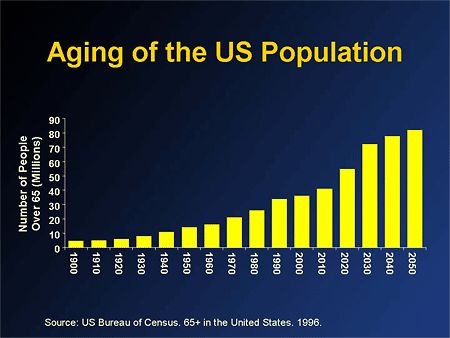An Aging Population: Demographic Changes in America

Based upon current trends, the population of the United States is expected to reach 438 million people by 2050. As of 10:26 p.m. on February 15th 2012, the population of the United States was 313,026,667 people. What does this substantial expected increase over the next 38 years look like in terms of age demographics in America?
According to the U.S Census Bureau’s national populationprojections, the structure of the U.S. population is aging steadily. Considering middle series projections, the median age of the population will rise from the current 36.9 years to 39 years in 2050. This is due, in large part to the aging baby boom generation. The first among this generation recently reached retirement age in 2011, and the last will hit retirement age in 2029. Members of the baby boom generation currently account for 25% of the total population in the United States.
The number of individuals over the age of 65 was 39.6 million in 2009. In 2030 this number is expected to increase to 72.1 million, accounting for 19% of the U.S. population. According to the International Journal on Epidemiology, simultaneously to this increase in elderly population, will be a decrease in the population of working age adults, or those 16 to 64 years of age. The “dependency ratio” of elderly persons to working adults is expected to rise from the 59 dependents per 100 working adults in 2005 to 72 dependents per 100 working adults in 2050. This will mean fewer people paying taxes and providing services in support of the older generation.
Source: U.S. Census BureauIn a paper, The Impact of Demographic Change on U.S. Labor Markets, economists from the Federal Reserve Bank of Boston, Jane Little and Robert Triest, pose the question, “How will a relatively small workforce supply the consumption needs of a growing number of dependents without a decline in U.S. living standards?”
In comparison, the elderly populations of European countries, such as the UK and Germany, already exceed that of the United States. In the UK the elderly demographic will rise to 20% of the entire population in the next 8 years. In Germany elderly persons over 65 already account for 20% of the population. This percentage is expected to increase to 33% by 2060. The world’s most elderly nation is currently Japan, with over 23% of its population 65 and older, and a projected 39.6% by 2050.
By 2050, the United Nations estimates that the elderly population of the world (persons 65 and over) will double, from 7.6% to 16.2%. How are we expecting to care for this increasing number of elderly dependents with a comparatively dwindling workforce, and if we cannot cope, what will be the implications?



